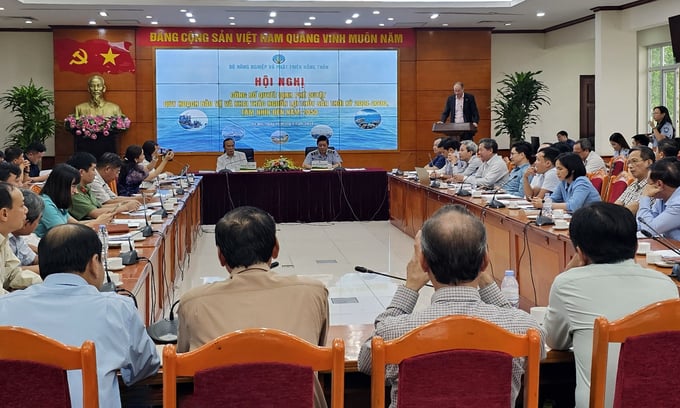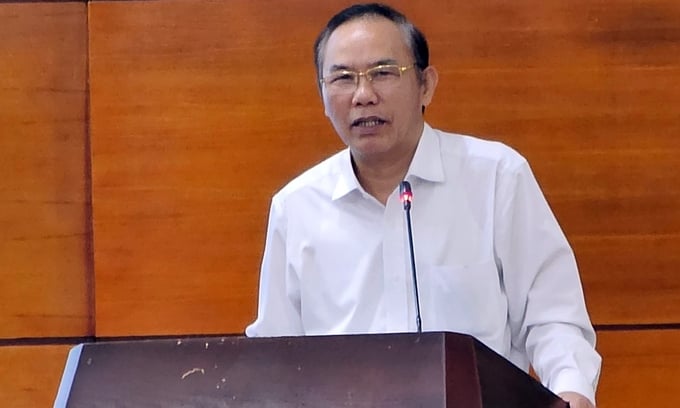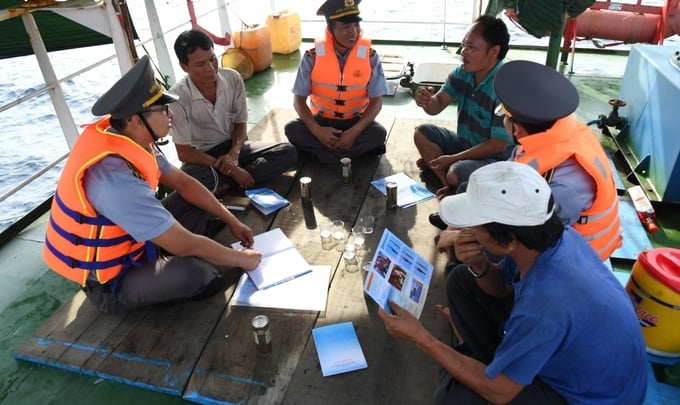May 30, 2025 | 10:01 GMT +7
May 30, 2025 | 10:01 GMT +7
Hotline: 0913.378.918
May 30, 2025 | 10:01 GMT +7
Hotline: 0913.378.918

Conference to announce the Planning for protection and exploitation of aquatic resources for the period 2021 - 2030, vision to 2050. Photo: Bao Thang.
"Vietnam has extremely favorable natural conditions, a large sea area, and diverse and abundant distribution of aquatic species, which is a strength in the development of the marine economy in general and the fisheries economy in general," Mr. Tien spoke at the announcement of the planning for the protection and exploitation of aquatic resources for the period 2021 - 2030, vision to 2050.
According to the Deputy Minister, in recent years, the fisheries economic sector has developed strongly, becoming a key economic sector of the country, making Vietnam one of the world's leading countries in seafood export.
During 2010 - 2020, the production value of the fisheries industry grew by 5.2% per year; Average income per capita increased 2.5 times; Export turnover had an average growth rate of about 6.1% per year. In 2023, total seafood output reached 9.269 million tons, and export turnover reached USD 9.2 billion, bringing Vietnam to third place globally, behind China and Norway.
This result has contributed to the country's economic development, improved livelihoods, stabilized life, and created jobs for more than 4 million people, especially for communities that depend on aquatic resources in 28 coastal provinces and cities.
Besides the achievements, the Deputy Minister also pointed out the challenges facing protecting and exploiting aquatic resources. These are Illegal, unreported, and unregulated (IUU) fishing; The decline in marine resources in both sea and inland areas due to overexploitation; The structure of the mining industry is not appropriate; The number of ships is still significant, especially ships exploiting coastal waters with fishing gear that destroys aquatic resources and exploits seasonally.
In addition, post-harvest losses in exploitation are high; Fishing vessel safety equipment is not guaranteed; Infrastructure and fisheries logistics services are not synchronized; Sovereignty disputes over maritime areas affect seafood exploitation; Aquatic reserves, aquatic resources, and ecosystems are declining.

Deputy Minister Phung Duc Tien: Fisheries planning needs to be associated with the interests and responsibilities of the community. Photo: Bao Thang.
The 2017 Fisheries Law and related legal documents have identified aquaculture and exploitation as one of the six priority marine economic sectors for breakthroughs by 2030. Protecting and exploiting sustainable aquatic resources sustainably makes an essential contribution to developing a sustainable marine economy.
"The Prime Minister's issuance of a decision approving the planning for the protection and exploitation of aquatic resources for 2021 - 2030, with a vision to 2050, is an important basis for reallocating space for conservation and preservation. Protect and exploit aquatic resources by the allowable capacity of resources and ecosystems.
The protection and exploitation of aquatic resources must be associated with the interests and responsibilities of the community, as determined by natural conditions. Socio-economic situation of each region", Deputy Minister Phung Duc Tien emphasized.
In the coming time, along with implementing the planning to protect and exploit aquatic resources, Deputy Minister Phung Duc Tien requested the Department of Fisheries and the Department of Fisheries Surveillance to coordinate closely with ministries, branches, localities, and industry associations. Effectively implement Decree No. 67/2014/ND-CP on fisheries development.
At the same time, land funds and budgets should be arranged, and social resources should be mobilized to implement the planning.
He said that, in addition to organizing and implementing, relevant levels and sectors need to strengthen inspection and promote communication on planning, contributing to reducing costs and pressure on the state budget.
"Sustainable and responsible fisheries development helps Vietnam integrate deeply and widely with the region and the world. We need to see clearly and propose solutions for each specific problem. Just talk about doing things, don't talk back, and avoid general discussions," the MARD leader shared.

Fisheries surveillance forces propagate sustainable marine farming to fishermen. Photo: Bao Thang.
In the recently issued plan, the Government directs the construction of 27 marine protected areas (6 have been established), equivalent to more than 450,000 hectares, accounting for nearly 0.5% of the total sea surface area. Total fishing output decreased to 2.8 million tons, with the number of fishing vessels down to 83,600.
Also, 59 aquatic resource protection zones were identified, 63 areas where aquatic exploitation was banned for a limited period, and 27 artificial habitat areas for marine species, preserving 138 genetic resources and protecting genetic pathways, the natural habitat of 16 aquatic species (including seven species of fish, five species of sea turtles, three species of squid, and one species of crab).
The MARD commits to issue a list of areas where fishing is soon banned for a certain period. At the same time, inspect, monitor, evaluate, review, and adjust planning according to regulations.
Mr. Patrick Haverman, Deputy Resident Representative for UNDP Vietnam, said that the total area of 27 marine protected areas in the new plan accounts for less than 0.5% of the total sea surface area. This number is still relatively low. He suggested that Vietnam allocate resources to accelerate this rate.
Translated by Huong Giang

(VAN) The mutual export of agrifood products between the European Union (EU) and the United Kingdom (UK) must occur again without certification, border controls or other red tape. This was agreed at the UK-EU summit.
/2025/05/22/5121-2-173645_677.jpg)
(VAN) NBSAP Tracker identifies strengths and areas for improvement in the National Biodiversity Strategy, based on each region’s priorities and capacities.

(VAN) The draft amendment to the Circular on rice export trading stipulates a periodic reporting regime for rice exporting enterprises.

(VAN) Dong Thap farmers attained an average profit margin of 64% during the summer-autumn 2024 crop (first season), while An Giang and Kien Giang farmers followed with 56% and 54%, respectively.

(VAN) As a doctoral student doing research on renewable energy and electrification at Harvard University, the author shares his musings on electricity, nature, and countryside memories.

(VAN) The decree on Extended Producer Responsibility (EPR) ensures transparent management and disbursement of support funds, avoiding the creation of a “give-and-take” mechanism.

(VAN) Hue City rigorously enforces regulations regarding marine fishing and resource exploitation, with a particular emphasis on the monitoring of fishing vessels to prevent illegal, unreported, and unregulated (IUU) fishing.